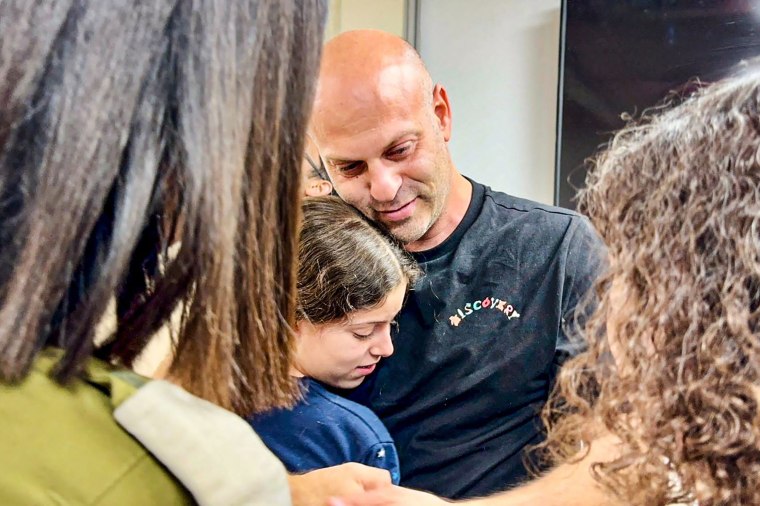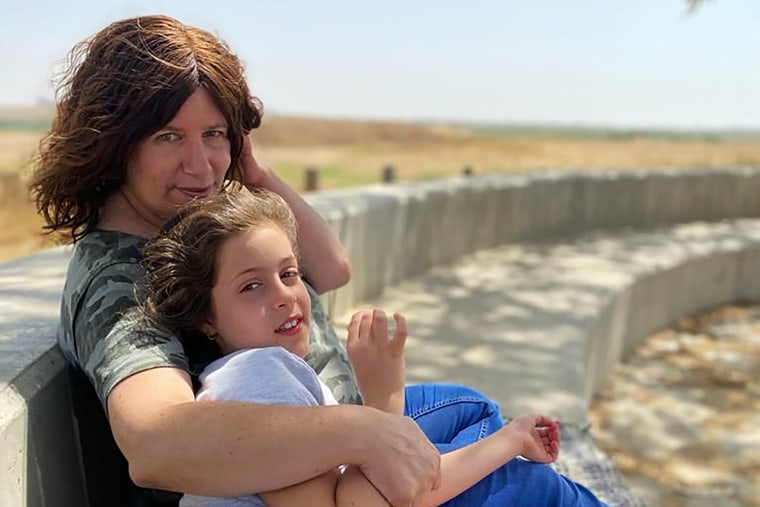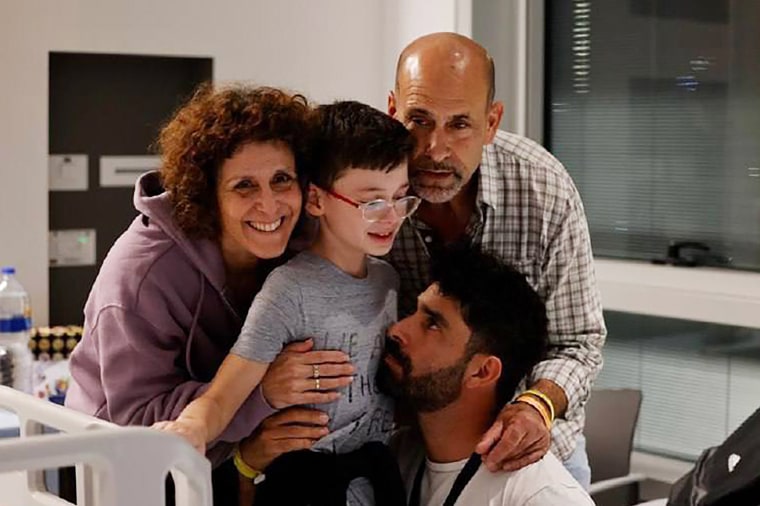TEL AVIV — As hostages released by Hamas this weekend try to settle back into some semblance of normal life, some of the first questions likely asked by those around them are deeply human: Where were you? What did you eat? Where did you sleep? Was there a bathroom?
Now, with the release of more than 50 hostages over the past three days, more details are trickling in from family members of those who have been freed as part of the temporary cease-fire agreement.
Hila Rotem Shoshani, who was 12 when she was taken, was released on Saturday without her mom, Raaya, who remains in Hamas custody. Raaya and Hila were kidnapped from the kibbutz in Be’eri on Oct. 7.
“She said they had toilets, they had food — not a lot. Sometimes there was not enough food, sometimes they were a little bit hungry. Sometimes there was more food,” her uncle Yair Rotem told NBC News outside the hospital where she is currently being monitored. A video released Sunday showed Hila running into her uncle’s arms after her release.

“Sometimes they waited for water,” Rotem said. “She said they brought water every once in a while in bottles.”
His niece has lost some weight, but looks fine physically, Rotem said, noting that she is still in shock and doesn’t show a lot of emotion. “She speaks about it like it’s a scene from a movie,” he added.
He would not say if Hila was kept in Hamas’ underground tunnels while in captivity.
What is certain is that her welcome home will be a stark contrast to what she experienced over the past seven weeks. Hila turns 13 on Monday and her family back in Tel Aviv were planning to throw a big birthday party for her, complete with balloons and cake.

Hila’s account of being in captivity, as recounted by her uncle, is one of several that have started coming in from family members since hostages were released in groups, one day at a time, starting on Friday.
Keren Munder, who was freed Friday along with her 9-year-old son, Ohad, and her mother, Ruthy, told her cousin, Merav Raviv, that they were given bread and rice while being held by Hamas, but food was in short supply. The trio were abducted by Hamas from kibbutz Nir Oz, where Keren and Ohad were visiting family.
They lost a lot of weight in captivity, Raviv told NBC News in Tel Aviv on Monday, and had to sleep on benches and the floor.
She said Keren told her the toilet was a “disaster,” and they had to knock on the door to let their captors know if they wanted to go, but sometimes had to wait up to two hours to be taken there.
Her cousin doesn’t know exactly where they were held, Raviv said, because they were moved from place to place. She was also in an information vacuum, Raviv added, and had no idea how many people were killed or taken hostage in the Oct. 7 attack, or how her family knew they were kidnapped. It was just the three of them together, and they did not see other hostages. The same man supervised them the whole time, Raviv said. They mostly spoke English with him.

Family members of other freed hostages spoke of their loved ones having to get adjusted to sunlight again after spending their time in darkness in Hamas tunnels, where it was suspected some of the hostages were being kept.
Eyal Nouri, the nephew of Adina Moshe, 72, who was freed on Friday after being kidnapped from her home in kibbutz Nir Oz, said his aunt “had to adjust to the sunlight” because she had been in darkness for weeks, The Associated Press reported.
“She was in complete darkness,” Nouri said. “She was walking with her eyes down because she was in a tunnel. She was not used to the daylight. And during her captivity, she was disconnected … from all the outside world.”
But the Israeli newspaper Haaretz reported Monday that some hostages followed Israeli media and were even informed about various events. And the aunt of Roni Krivoi, released on Sunday after getting kidnapped by Hamas from a music festival, told Israeli public radio station Reshet Bet that her nephew managed to escape from his captors, but local residents captured him and handed him back to Hamas.
The accounts come weeks after initial details shared by Yocheved Lifshitz, 85, who was released last month before the cease-fire. She made headlines when, as she was being released, she turned to one of the armed, balaclava-clad Hamas militants and shook his hand, uttered “shalom” — a Hebrew salutation meaning “peace.”
Lifshitz told reporters after her release that she went through “hell” when she and her husband were abducted from Nir Oz. She said the Hamas militants beat her in the ribs with sticks, but she also said that her captors treated her and others well in captivity. Lifshitz said she was held in tunnels under Gaza that resembled a “spider web,” where they received medical care, including medication. The captives shared food with the militants, who kept conditions sanitary, she said.
Israel has vowed to bring all hostages home, but has also signaled that the war will resume in full force as soon as the cease-fire is over. On Monday, Hamas and Qatari mediators said they had brokered a deal to extend the truce for two more days. Israel previously said that it was willing to extend the cease-fire by one day for every 10 additional hostages released.
In the meantime, family members and loved ones of the hostages who are still being held wait in fear, trepidation and agony over their well-being.
Richard Engel and Raf Sanchez reported from Tel Aviv, Yuliya Talmazan from London.






